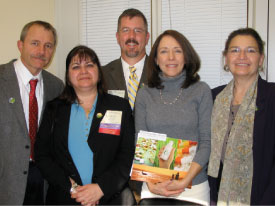Public policy report
This article was originally published in June 2009

(June 2009) — From time to time, PCC engages in public outreach and policy initiatives, as events warrant. Here’s a recent sampling:
- PCC health and body care staff met with lawmakers in Olympia and Washington D.C. to advocate for legislation of importance to the natural supplement and body care products industry.
- Public affairs staff testified in Olympia on food safety issues and a proposal to establish a Washington state food safety commission.
- PCC joined the Center for Food Safety in advocating tighter regulations than those proposed for genetically modified crops.
- Public affairs staff joined the Cattle Producers of Washington in Olympia to seek support for reinstating state meat inspections, to improve market access for smaller ranchers.
- PCC sent a letter to the U.S. Department of Agriculture and Washington State’s U.S. Senators opposing the proposed National Animal ID System.
- PCC wrote the Obama administration asking it to endorse the International Assessment of Agricultural Knowledge, Science and Technology for Development (IAASTD). The IAASTD advocates a shift from industrial agriculture to small-scale and organic farming to cope with population growth and climate change, and avoid environmental collapse and social breakdown.
- A nutrition educator offered a presentation on nutrition and food systems to an AmeriCorps branch.
- A nutrition educator joined a YWCA dinner meeting for Headstart parents and discussed childhood nutrition.
- A nutrition educator offered a presentation to the Edmonds Methodist Church on sustainable food choices (seasonal/organic/plant centered).
- A nutrition educator offered a store tour about eating on a budget for low-income Housing Authority residents.
- A nutrition educator presented a class about eating healthy on a budget to a parents’ group at the French Immersion School.
